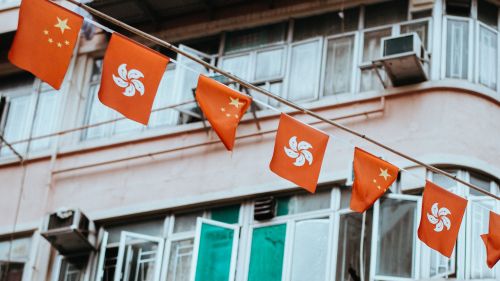Business Leaders React to China's National Security Law for Hong Kong

As China tightens security in Hong Kong, many American businesses consider retreat and relocalization
On May 22, China announced a controversial new national security law on its semi-autonomous territory of Hong Kong. Officially meant to stifle acts of terrorism, subversion, secession, and “collusion with foreign and external forces to endanger national security,” governments and citizens alike have disagreed over whether or not it is an affront to the principle of “One Country, Two Systems,” the basis for Hong Kong’s semi-autonomous status.
Over the weekend, Chinese state-run media unveiled details revealing that the law may mandate the creation of a new central-government office in the territory, charged with powers related to national security, such as exercising jurisdiction over certain criminal cases and overseeing the handling of national security affairs by local agencies. Backed by Beijing, Hong Kong Chief Executive Carrie Lam has downplayed criticism of the new law, mentioning that it only “aims to prevent, curb, and sanction an extremely small minority of criminals who threaten national security.”
While several governments around the world have expressed concern over the law, the US administration has been among the first to take action in response. US Secretary of State Mike Pompeo believes that the national security law “fundamentally undermine[s] Hong Kong’s autonomy and freedom,” and recently decertified Hong Kong as an autonomous entity. This certification allows the United States to retain agreements with Hong Kong on issues like trade and law enforcement which are separate from those made with Mainland China as long as the United States certifies Hong Kong as maintaining sufficient autonomy from the mainland. The recent decision to decertify Hong Kong has paved the way for the territory to be effectively stripped of this special status under US law.
Although Pompeo meant to send this as a signal of US disapproval of Beijing’s proposed law, some analysts fear that among other potential pitfalls, this decertification may hurt business prospects between the US and Hong Kong because of the great extent to which American companies conduct business within the territory. Hong Kong is home to over 1,300 subsidiaries of American businesses, ranking the United States as third among countries with the greatest number of subsidiaries in Hong Kong. Moreover, Hong Kong charges next to no tariffs on US products, making it a prime export market. In 2019, for example, the United States enjoyed a nearly $26 billion trade surplus with the territory.
With this trading relationship and Hong Kong’s special status in jeopardy, a recent survey conducted from June 1-2 by the American Chamber of Commerce in Hong Kong set out to gauge the feelings toward the national security law among 180 of its members. The sample was not scientifically drawn (respondents self-selected to participate or not), but the results are indicative of the business mood in Hong Kong at this time. Most of the Chamber’s total membership represents US companies though some members represent businesses based in Hong Kong and other countries.
The majority of the survey’s respondents say they are concerned (83%) about Hong Kong’s national security law (53% are “very concerned”) and think it is ambiguous in terms of its scope and enforcement (64%). In open-ended remarks, respondents expanded upon their fears by commenting that the national security law “is a serious concern, both for the signals it sends to those outside of Hong Kong (in the U.S., the EU, China and elsewhere) about [Hong Kong’s] eroding high degree of autonomy and, separately, to the very real dangers that it brings to business and other activities within Hong Kong.” Others shared these concerns and noted the potential negative impacts the law could bring to investment and recruiting.
Although the new national security law has yet to be implemented, six out of ten Chamber respondents (60%) believe it will harm their business operations and about three in ten (29%) say they are considering relocating their companies’ assets, capital, and/or business operations because of it. In response to the US Department of State’s decision to strip Hong Kong of its special status, most say they are adopting a wait and see approach (74%) though some say they are reducing their investments in Hong Kong (18%). One respondent elaborated on this wait-and-see approach by remarking, “It is far too early to make strategic decisions on the revocation of special trade status as this will take many months to implement and finally impact [Hong Kong].” While most respondents are unsure of the revocation’s impact, some are more certain, remarking, “US-initiated changes of [Hong Kong’s] special status following the national security law could bring uncertainty” and that, “The potential to reduce investment in [Hong Kong] is real.”
Rounding out the survey, nearly half are pessimistic about medium to long-term business prospects in Hong Kong (48%) while about a third are optimistic (36%). One respondent described their pessimism as being “fearful that the luster will be lost forever.” Over one-third (38%) are planning on leaving Hong Kong because of concerns with the national security law. Still, most (62%) are not personally planning on leaving the territory, at least in the short term.
Just as the full scope of China’s new national security law has yet to be realized, so too has its full impact on both Hong Kong’s business environment and US relations with Hong Kong. Businesspeople seem to be taking note of this, as only a small number of them are planning to make changes now, with most waiting to see the law’s full impact and scope. In any case, Beijing’s new national security law and the US response to it are unlikely going to help the people of Hong Kong in their quest for greater self-governance.

